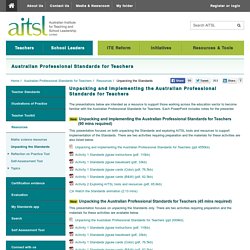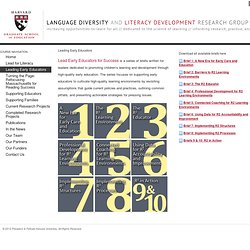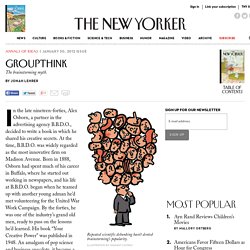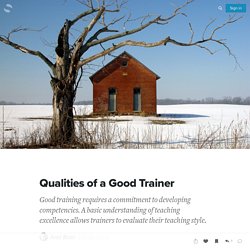

Unpacking the Standards. The presentations below are intended as a resource to support those working across the education sector to become familiar with the Australian Professional Standards for Teachers.

Each PowerPoint includes notes for the presenter. New Unpacking and implementing the Australian Professional Standards for Teachers (90 mins required) This presentation focuses on both unpacking the Standards and exploring AITSL tools and resources to support implementation of the Standards. There are two activities requiring preparation and the materials for these activities are also listed below. Unpacking and implementing the Australian Professional Standards for Teachers (ppt 4550kb) Activity 1 Standards jigsaw instructions (pdf, 110kb) Activity 1 Standards jigsaw baseboard (pdf, 33kb) Activity 1 Standards jigsaw cards (Color) (pdf, 76.5kb) Activity 1 Standards jigsaw cards (B&W) (pdf, 62.5kb) Activity 2 Exploring AITSL tools and resources (pdf, 65.6kb) Watch the Standards animation (2:13 mins)
The Ten Components. Lesson plan template and guidelines. Relearning the Art of Asking Questions. Adult Learning Principles. Courses - Mindworks. Leading Early Educators § Language Diversity & Literacy Development Research Group. Skip to main content.

Leading Early Educators Lead Early Educators for Success is a series of briefs written for leaders dedicated to promoting children’s learning and development through high-quality early education. The series focuses on supporting early educators to cultivate high-quality learning environments by revisiting assumptions that guide current policies and practices, outlining common pitfalls, and presenting actionable strategies for pressing issues.
Download all available briefs here Brief 1: A New Era for Early Care and Education Brief 2: Barriers to R2 Learning Environments Brief 3: The R2 Educator Brief 4: Professional Development for R2 Learning Environments Brief 5: Connected Coaching for R2 Learning Environments Brief 6: Using Data for R2 Accountability and Improvement Brief 7: Implementing R2 Structures Brief 8: Implementing R2 Processes Briefs 9 & 10: R2 in Action. 10+ Getting to Know You Activities for Teens & Adults. Groupthink - The New Yorker. In the late nineteen-forties, Alex Osborn, a partner in the advertising agency B.B.D.O., decided to write a book in which he shared his creative secrets.

At the time, B.B.D.O. was widely regarded as the most innovative firm on Madison Avenue. Born in 1888, Osborn had spent much of his career in Buffalo, where he started out working in newspapers, and his life at B.B.D.O. began when he teamed up with another young adman he’d met volunteering for the United War Work Campaign. By the forties, he was one of the industry’s grand old men, ready to pass on the lessons he’d learned. Exploratree - Exploratree by FutureLab. Qualities of a Good Trainer. Adult learning has a much greater chance of success when the trainer or teacher is competent.

An instructor that strives for excellence will demonstrate each of the following qualities of a good trainer. Exudes Patience A good trainer needs to have incredible patience. Often learners are frustrated when introduced to new concepts and they need the trainer or teacher to re-frame the information in a way that will encourage them to see beyond a block in learning. Explains Concepts Simply Often in an attempt to convey a new concept, poor trainers tend to over complicate with providing a high level of detail.
Facilitates Active Learning Lectures provide information to the masses but for true learning to occur, a good trainer facilitates active learning by finding ways for the learner to uncover the key concepts through discovery and practice. Uses Creative Approaches Variety is the spice of life and it also spices up learning. Demonstrates Acceptance of Different Views Motivates Learning.